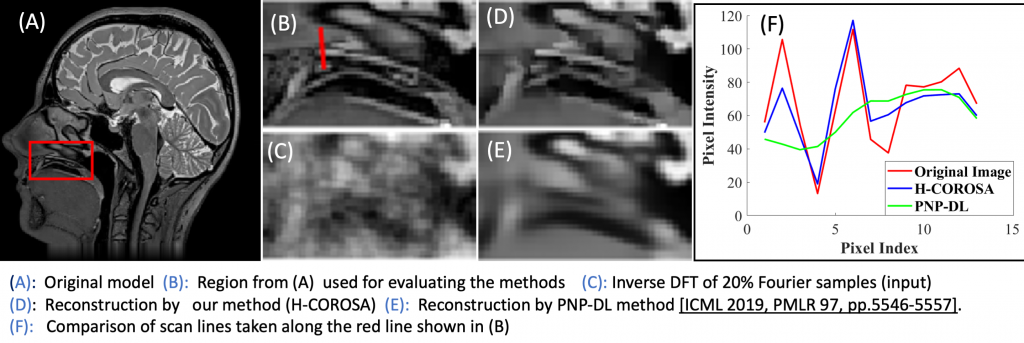Magnetic resonance imaging (MRI) is one of the most important medical imaging modalities owing to its non-invasiveness. To effectively use it to study fast physiological processes, it has to be operated in sparse-sampling mode such that it measures only a small fraction of Fourier samples in the cross-section plane of interest. In such scenarios, the efficiency of the computational method that recovers full images from the sparse-samples plays a crucial role in determining the success of the study. The literature on image reconstruction developed for such scenarios is dominated by two classes of methods known as compressive sensing methods and deep-learning methods. Compressive sensing methods give severely distorted reconstructions when the sparsity of measurements becomes higher than a certain threshold, and in such cases, deep-learning methods are believed to perform better. However, their need for training data limits their applicability.
We developed an adaptive regularization method that outperforms compressive sensing methods and well-established deep learning methods in terms of retrieving high-quality reconstructions from sparse Fourier samples. The method detects and exploits any pattern in the relative distribution of the gradients and the Eigenvalues of Hessians of the underlying image without requiring any training data. Our method is called the Hessian-based Combined Order Regularization with Optimal Spatial Adaptation (H-COROSA). The figure compares the performance of H-COROSA with a widely successful deep-learning method proposed under the category of Plug-and-Play (PNP-DL) methods, which clearly demonstrates the superiority of H-COROSA.
Reference:
Sanjay Viswanath , Manu Ghulyani , Simon De Beco, Maxime Dahan, and Muthuvel Arigovindan, “Image Restoration by Combined Order Regularization With Optimal Spatial Adaptation.”, IEEE TRANSACTIONS ON IMAGE PROCESSING, VOL. 29, pp, 6315-6329, 2020

